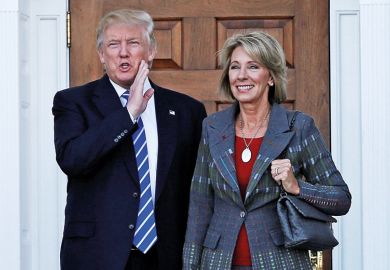Academics (and journalists) have been accused in the aftermath of the presidential election of being “out of touch” with the American electorate. At the same time, academics have played important leadership roles in eras and places in which free expression has come under threat – as some believe it is now in the US.
What is the role of the academic in such an era, or, at the very least, what are the academic’s obligations to his or her profession, campus and government?
Rachel Barney, a professor of classics and philosophy at the University of Toronto (and a dual US-Canadian citizen), has proposed what she’s calling the Anti-Authoritarian Academic Code of Conduct.
Here's the 10-point code in full:
- I will not aid in the registering, rounding up or internment of students and colleagues on the basis of their religious beliefs.
- I will not aid in the marginalisation, exclusion or deportation of my undocumented students and colleagues.
- I will, as my capacities allow, discourage and defend against the bullying and harassment of vulnerable students and colleagues targeted for important aspects of their identity (such as race, gender, religious beliefs, sexual orientation, etc.).
- I will not aid government or law enforcement in activities which violate the US Constitution or other US law.
- I will not aid in government surveillance. I will not inform.
- As a teacher and researcher, I will not be bought or intimidated. I will present the state of research in my field accurately, whether or not it is what the government wants to hear. I will challenge others when they lie.
- I will not be shy about my commitment to academic values: truth, objectivity, free inquiry and rational debate. I will challenge others when they engage in behavior contrary to these values.
- As an administrator, I will defend my students, faculty and non-academic staff. I will not allow the expulsion, firing, disciplining, harassment or marginalisation of individuals targeted for being members of disfavored groups or for expressing dangerous opinions. I will speak up for academic freedom. I will insist on the autonomy of my institution.
- I will stand with my colleagues at other institutions, and defend their rights and freedoms.
- I will be fair and unbiased in the classroom, in grading and in all my dealings with all my students, including those who disagree with me politically.
The proposed code is similar to some of the points made by other academic groups since the election, including a petition advancing the notion of “sanctuary campuses” for undocumented students, and the American Association of University Professors’ condemnation of hate crimes.
Barney’s post-Trump proposal is the first to appear as a code to be adopted, voluntarily, by individual professors across disciplines. Asked whether she thought academics would actually need it, Barney said, “I don’t think we know how authoritarian the Trump administration might turn out to be, but his personnel appointments and recent pronouncements suggest ‘very’, as well as generally irresponsible and not constrained by law.”
Troubling examples include Stephen Bannon, former head of Breitbart News, as chief strategist, and Senator Jeff Sessions, an Alabama Republican who was once denied a federal judgeship due to charges of racism, as attorney general, Barney said. Trump also has denied that climate change is real. “So if there’s going to be a war on civil liberties, cultural liberalism and scientific fact, it’s really hard to see how higher ed can fail to be a major battlefield,” she added.
Also last week, 400 faculty members at the Massachusetts Institute of Technology signed a statement affirming their shared commitment to diversity and inclusion, the free and respectful exchange of ideas, and objective inquiry and the scientific method.
“The president-elect has appointed individuals to positions of power who have endorsed racism, misogyny and religious bigotry, and denied the widespread scientific consensus on climate change,” reads the MIT statement. “Regardless of our political views, these endorsements violate principles at the core of MIT’s mission. At this time, it is important to reaffirm the values we hold in common.”
Of science, in particular, the statement says it “is not a special interest; it is not optional. Science is a foundational ingredient in how we as a society analyze, understand and solve the most difficult challenges that we face.”
“For any member of our community who may feel fear or oppression, our doors are open and we are ready to help,” pledged such notable signatories as Susan Solomon, Tim Berners-Lee, Noam Chomsky, Junot Díaz and Jonathan Gruber. “We pledge to work with all members of the community – students, faculty, staff, postdoctoral researchers and administrators – to defend these principles today and in the times ahead.”
Joi Ito, director of the MIT Media Lab, added in a separate statement that academic institutions “have historically been havens to protect diversity of opinions and the freedom to express those opinions when the political climate has impinged on this freedom. It appears that we are entering a period where the political climate requires us to assert our leadership to protect and foster diversity and scientific inquiry itself.”
The MIT faculty statement was issued ahead of a planned visit by Bannon to nearby Harvard University. A graduate of Harvard Business School, Bannon was scheduled to attend a conference on presidential campaign politics.
Barney said she was inspired by reading about authoritarianism via Timothy Snyder, the Housum professor of history at Yale University, and Masha Gessen, a well-known Russian-born journalist.
In a recent Slate piece about Adolf Hitler’s election, for example, Snyder – a historian of the Holocaust – pointedly drew many parallels to Trump’s rise. “The left received one million more votes than his party,” Snyder wrote. “But due to the vagaries of the electoral system, he was called upon to form a government. His followers exulted, but the various right-wing elites preserved their calm. Although they had failed to keep him from power, they were sure that they could control him. He was good at convincing his followers that he was a revolutionary and convincing others that he was harmless.”
Gessen wrote her own set of rules for living under an autocracy recently in The New York Review of Books. “Trump is the first candidate in memory who ran not for president but for autocrat – and won,” she wrote. “I have lived in autocracies most of my life, and have spent much of my career writing about Vladimir Putin’s Russia. I have learned a few rules for surviving in an autocracy and salvaging your sanity and self-respect.” Rule No. 1? “Believe the autocrat. He means what he says. Whenever you find yourself thinking, or hear others claiming, that he is exaggerating, that is our innate tendency to reach for a rationalization.”
Barney, who was also practically inspired by Atul Gawande’s exaltation of the checklist in The Checklist Manifesto: How to Get Things Right, said she wasn’t trying to “urge heroism or tell anybody what to go do”. Whether the code gains traction “will depend entirely on whether people working in the US find it personally useful, and that's as it should be”, she added. But Snyder, Gessen and others who know authoritarian societies “make it clear that forewarned is forearmed”.
Whether the code gains traction remains to be seen, and some will certainly disagree with both its premise and its suggestions (indeed, some already have).
But it’s attracting interest on the popular philosophy blog Daily Nous. Editor Justin Weinberg, an associate professor of philosophy at the University of South Carolina, wrote that there’s no way to know for sure how authoritarian the US government will become under a Trump administration. So under “conditions of uncertainty, how do we identify the line between panicked overreaction and responsible preparation?” he asked. “At the very least, we could look for and assess minimally costly means of preparation. One option along these lines is to try to mentally prepare ourselves to refuse to cooperate with illiberal or immoral government initiatives.”
Daily Nous invites comments and amendments to the code. (One philosopher called at least one aspect “pretty radical”.) But, Weinberg said, “If you agree with enough of this, please share it with others at your school and in your social networks. Consider printing it out and hanging it in your office or on your office door.”
He added, “And keep these 10 items in mind, so if the time comes, you are a little more prepared than you otherwise might be.”
Nancy Kanwisher, a professor of brain and cognitive sciences at MIT who co-organised the new statement of shared values, said recent events “have prompted many academics to take a public stance defending precious aspects of our society that suddenly need a lot more defending than they did just a few months ago”.
In times of political uncertainty, she said, academics have a “special role to play, especially tenured faculty who have the great privilege of being able to call a spade a spade without fear of losing their jobs”.
At MIT, Kanwisher added, “we also have a duty to remind people that science is not a special interest”, but rather “the best procedure human beings have for discovering nonpartisan truths about our world – truths that have been harnessed to improve the lives of everyone in our country, and truths that will be essential for society to plan for the future”.
If those views are out of step with much of the country, she added – noting that Trump received less than half the popular vote – then it's not “scientists who need to rethink science, but the electorate who needs to be reminded that their quality of life and their health and their futures depend upon science”.
This is a version of an article that first appeared on Inside Higher Ed
Register to continue
Why register?
- Registration is free and only takes a moment
- Once registered, you can read 3 articles a month
- Sign up for our newsletter
Subscribe
Or subscribe for unlimited access to:
- Unlimited access to news, views, insights & reviews
- Digital editions
- Digital access to THE’s university and college rankings analysis
Already registered or a current subscriber? Login






